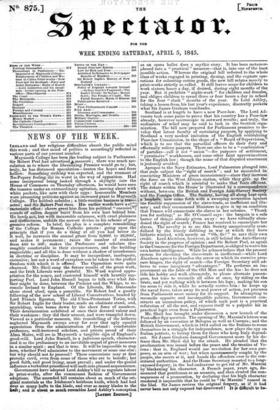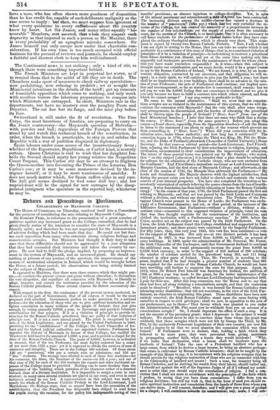NEWS OF THE WEEK.
IRELAND and her religious difficulties absorb the public mind this week ; and that mood of politics is accordingly reflected in various parts of our present number. Maynooth College has been the .leading subject in Parliament. Sir Robert Peel had advertised measure ; there was much spe- culation as to where the liberalfzing Premier would go tobut, truly, he has distanced speculation—beaten the hopes and fears hollow. Something striking was expected, and the remnant of No-Popery feeling did its worst in the way of opposition. Had some mcorporeal being looked through a skylight into the House of Commons on Thursday' afternoon, he would have seen the inmates under an extraordinary agitation, moving about with white packets, like ants with their eggs : honourable Members were presenting petitions against an increased grant to Maynooth College. The hubbub subsides ; a little routine business is trews. acted ; and Sir Jtnbert Peel rises. His earlier words have a off," racteristic effect : cheers greet him _from his political " enemies; sounds of sullen despair lniriefroln his own host behind him. He heeds not, but with inexorable calmness, with cruel plainness end-distinctness, unfolds the newest device in his scheme of pro- gressive reform. In brief, his plan is a complete remodelling of the College for Roman Catholic priests : going upon the principle that if you do a thing at all you had better do it well, he increases the annual grant from 9,0001. to 26,0001., and makes it permanent ; raises the number of students from 440 to 500; makes the Professors and scholars tho- roughly comfortable in their circumstances, and the building respectable; and all this is done without a shadow of interference in docttine or discipline. It may be inexpedient, inadequate, excessive; but not a word of exception can be taken to the perfect freedom with which it is offered. The Opposition were quite chorine& Mr. Sheil sang the future results of the great work, and the Irish Liberals were grateful. Mr. Ward waived appro- priation for the nonce, and contented himself with heartily sup- porting. Peel. Lord John Russell began to talk over what fur- ther might be done, between the Premier and the Whigs, to re- concile Ireland to England. Of the Liberals, Mr. Duncombe alone stood aloof, upon a punctilio. Sir Robert had a goodly following of the new school of Liberal Conservatives, headed by Lord Francis Egerton. The old Ultra-Protestant Tories, with Sir Robert Inglis for their leader, made an obstinate stand, and, unyielding, were borne down by the sheer force of numbers. Their determination exhibited at once their devoted valour and their weakness : they did their utmost, and were trampled down. Viewed as aparticular measure, this remodelling of the hitherto neglected. Maynooth sweeps away for ever that ugly squalid opprobrium from the administration of Ireland : comfortable professors, well-bestowed scholars, and priests proud of their Alma Mater, will see in Maynooth a tangible sign of England's good-will. Lord John Russell, in a judicious speech, character-
ized it as the preliminary to an inevitable sequel of great measures in a similar. spirit : and that is true. It will be impossible to atop here, whether Peel administer to the movement or some one else: but why should not he proceed? These concessions may at first provoke cavil, even from some of those who are to benefit; but good faith, and good fixing, must prevail ; and under the genial influence a turbulent priesthood will melt into pleased acquiescence. Government have adopted Lord Ashley's bill to regulate labour
in print-works, after the commonest fashion of Government adoptions. The amended bill contains about as much of the ori- ginal materials as the Irishman's heirloom knife, which had had ,ever so many hafts to the blade, and ever so many blades to the bolsi and it abort as much resembles Lord Ashley's conception
as an opera ballet does a mythic story. It has been metamor- phosed into a " practical " measure—that is, into one of the least possible action. Whereas the original bill referred to the whole class of works engaged in printing, dyeing, and the cognate ope- rations for colouring cotton goods, the new bill relates merely to print-works strictly so called. It ;till leaves scope for children to work sixteen hours a day, if desired, during eight months of the year. But it prohibits night-work " for children and females; and obliges children to spend three or four hours a day in school for the four " slack " months of the year. So Lord Ashley, taking a lesson from his last year's experience, discreetly pockets what Sir James Graham vouchsafes.
Scotland is at length to have a new Poor-law. The Lord Ad- vocate took some pains to prove that his country has a Poor-law already, however microscopic in outward results ; and truly, the rudiments of relief may be said to lurk in the Scottish orga- nization. The bill now prepared for Parliament promises to de- velop that latent faculty of sustaining paupers by applying to i
Scotland a very modest imitation of the English. centralizing Poor-law Commission, in the shape of a "Board. of Supervision,'
which is to see that the parochial officers do their duty and effectually relieve paupers. There are also to be a " combination" of parishes—call it not " union "—for purposes of settlement,' " permissive" workhouses, and some other faint approximations, to the English law; though the name of that disputed enactment is jealously avoided.
Apropos to the Navy Estimates, Lord Palmerston plunged into, that stale subject the "right of search " ; and he succeeded, in.' convicting Ministers of gross inconsistency—since they increase', the force on the West African station,. while they give up the-. right 'of search which 'is es'sential to inake that force efficient. The debate within' the Heulieuis - illustrated by a correspondence without, between the British and Foreign Anti-Slavery Society and the Foreign Office. The Society, having all along kept open a' loophole, now come forth with a sweeping accusation against tne forcible suppression of the slave-trade, as inefficient and illu- sory; and they recommend Ministers to give it -11p on condition that France will emancipate the slaves in her colonies. " Thank you for nothing," as Mr. O'Connell says : the bargain is a safe barter of things already given away : we have virtually aban- doned the right of search ; France has resolved to emancipate her slaves. The novelty is to see this Society unequivocally scan- dalized by the bloody dabbling in war at which they have hitherto winked, with merely an " Oh, fie I " to save their own credit. Lord Aberdeen, however, is still behind the Anti-Slavery Society in the progress of opinion ; and Sir Robert Peel, as agent , in the Commons for the Foreign Department, is obliged to waive his own better intelligence. While he acknowledges that the present system for checking the slave-trade is ineffectual—while Lord Aberdeen agrees to abandon the screw on which its coercive pres- sure hinges, the right of search—the Foreign Secretary still ad- heres to some imaginary " advantages." He performs an im- provement on the fable of the Old Man and the Ass : he does not ride his hobby and walk alternately, to please alternate passen- gers, but tries to reconcile all sides at once, by riding on the brute, and yet walking with it between his legs; making his son too seem to ride it, while he actually carries him : he keeps up the naval force, takes away its real power of action, yet procures from Parliament more money for its support. In attempting to reconcile opposite and incompatible policies, Government con- structs an anomalous policy, of which each part is a practical refutation of all the rest, and exposes itself to a palpable hit in practical logic even from a Palmerston. Mr. Sheil has brought under discussion a new branch of the Post-office Spy question. The opening of Mr. Mazzini's letters was followed by an execution at Bologna as well as Cosenza ; and the British Government, which in 1814 called on the Italians to rouse themselves in a struggle for inde,pendence, now plays the spy on Italian patriots, to betray them for those who keep Italy depend- ent. Sir James Graham damaged Government more by his de- fence than Mr. Sheil did by the attack. He pleaded that the proclamation was issued before the peace and the treaties of Ve- rona : that is, England would use revolution for her own pur- poses, as an arm of war ; but when spontaneously sought by the people, she sneers at it, and hands the offenders over to the con- stituted authorities. And the Home Secretary resorted to a long- exposed forgery, in the bad endeavour to get rid of Mr. Mazzui by blackening his character. A French paper, years ago, de- nounced that gentleman as an assassin, and then evaded the con- sequences of a prosecution, by declaring that his high character rendered it impossible that could be "the Mazzini " named in the libel. Sir James revives the original forgery, as if it had -never been not only exposed but disavowed l It difacult to be- lieve a man, who has often shown more goodness of disposition than he has credit for, capable of such deliberate malignity as the case seems to imply : bat then, we must suppose him ignorant Of what every quidnunc inLevery coffeehouse about the country knew by heart. Let Sir:James, and many other equally "hog nourable" Members,' seat assured, that-when they suspeet such- depravity as that imputed in such a person as Mr. Mazzoni, there is every probability of an egregious mistake somewhere. Sir James himself can only escape now under that charitable con-, sideration. If his own time is too much occupied with official business for the perusal of reviews and journals, he should employ a faithful and discreet clerk to keep him well-informed.



























 Previous page
Previous page